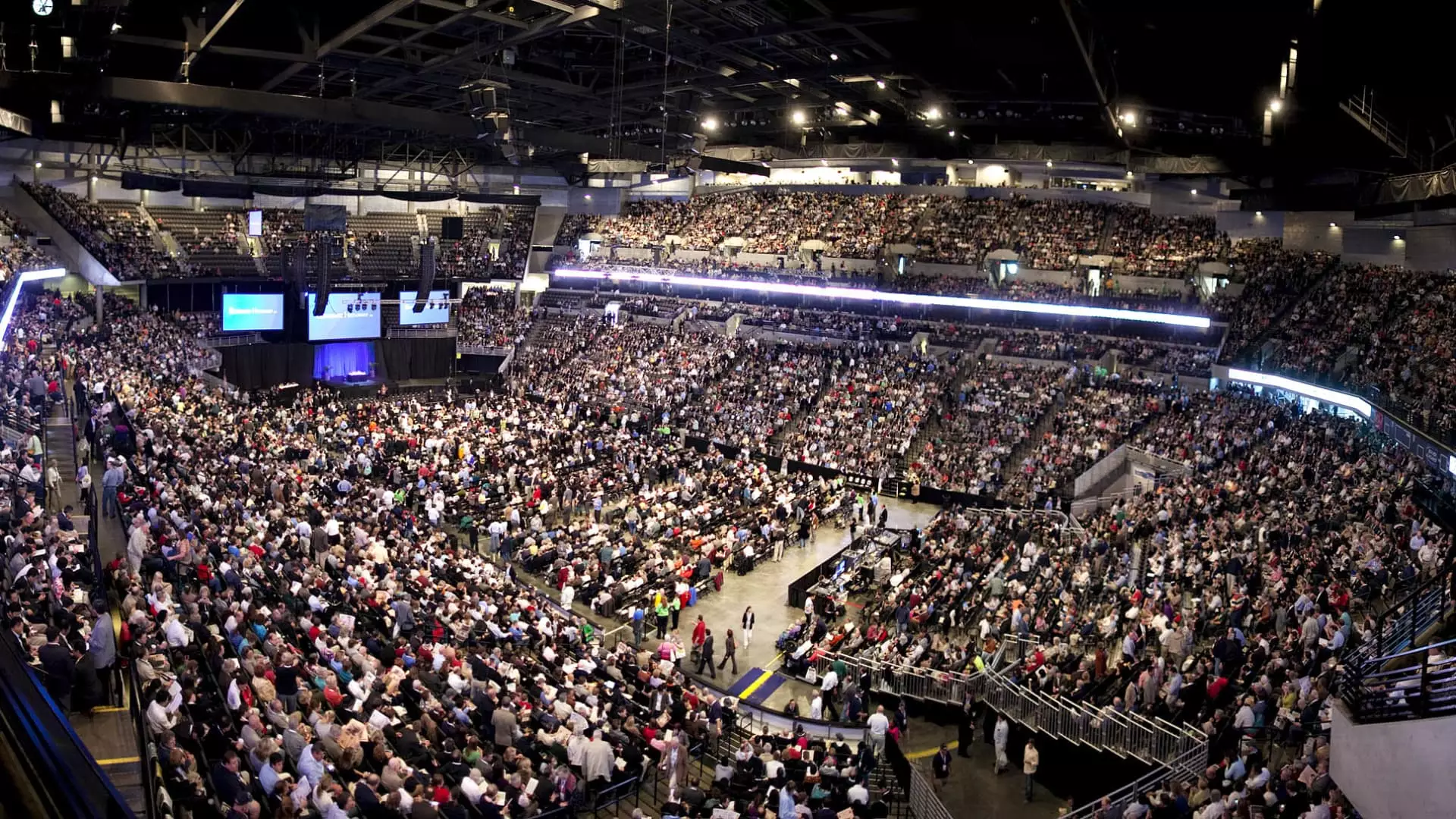Berkshire Hathaway’s annual meeting has transformed from a modest gathering into a colossal spectacle, drawing thousands of eager attendees from all corners of the globe. What started as an intimate assembly in 1965, comprised of merely a dozen hopeful investors, has now evolved into an extravagant cornucopia of capitalism often dubbed the “Woodstock for Capitalists.” Every year, this brilliantly orchestrated event sees approximately 40,000 participants flooding into Omaha, Nebraska, not merely to witness an expansive display of shareholder favoritism, but to join a community that vibrantly celebrates the principles of investment, business acumen, and life itself.
This significant growth and vitality can be directly attributed to the magnetic persona of Warren Buffett—a man who has not only rewritten the script of investment success but has managed to create a cultural phenomenon around it. At 94 years old, Buffett, renowned as the “Oracle of Omaha,” shares his wisdom on finance and existence with a passion that transcends the numbers. This year’s gathering, however, casts a somber shadow, marking the second annual meeting since the passing of Charlie Munger, Buffett’s right-hand man and strategic counterpart. Yet, despite this absence, the enthusiasm among attendees remains undiminished, testifying to the strong foundation built over decades.
Shifting Dynamics and New Voices
The dynamic at this year’s meeting also underscores a generational shift within the company. With Buffett sharing the stage with Greg Abel and Ajit Jain, we see an aspirational passing of the torch, albeit layered with the nostalgia of a duo that defined an era. As attendees line up before dawn, eager for the pearls of wisdom dropped by these financial titans, one can’t help but wonder how Abel and Jain will continue to uphold the value-laden ethos of Berkshire in an increasingly complex economic landscape.
Interestingly, this year introduces a limited edition book titled “60 Years of Berkshire Hathaway,” encapsulating Buffett’s extraordinary tenure. The ideation behind this book goes beyond mere nostalgia; it integrates philanthropy into the fabric of capitalism. Auctioning signed copies to benefit the Stephen Center, a charity supporting homeless youth and adults in Omaha, introduces an essential dialogue about the responsibilities business magnates have toward society—a topic often left in the shadows by the more calculated discussions of profit and revenue.
Festival of Fidelity and Community
The annual meeting now resembles more than just a traditional shareholder engagement; it has morphed into a celebration—a festival combining camaraderie and capitalist philosophies with recreational activities and marketplaces. From the “Berkshire Bazaar of Bargains,” showcasing merchandise from its subsidiaries, to the energetic participation in a 5-kilometer run, the weekend is packed with events that foster lasting connections among participants. Longtime attendee Christopher Bloomstran, who likens the event to a rite of passage for new investors, highlights the intrinsic value in these gatherings that extends beyond financial growth.
Despite the accessibility of livestreaming, many attendees emphasize the unique in-person experience—something akin to a spiritual pilgrimage. Adam Mead poignantly captures this sentiment, suggesting that, though not religious, one could liken the collective gathering to a church service. The palpable energy, the exchange of ideas, and the communal aspiration suggest that Buffett and his cohorts haven’t just built a company—they’ve architected a movement.
Entertainment and Education in Financial Discourse
However, the meeting is not exempt from evolving entertainment standards. This year, the absence of the popular movie introduction, a staple of past events, raises questions about whether the unique charm of these gatherings is being somewhat diluted. While changes can often indicate progress, one must be cautious not to encapsulate the essence of what made this event special in the first place. Attendees are there not just to hear about numbers—it’s the stories, the reflections, and the learning moments that create a compelling narrative around Berkshire Hathaway.
The exclusive coverage by CNBC and bilingual webcasts aim to broaden the scope of engagement, yet one wonders: Will this mass dissemination compromise the intimate dynamism that characterizes the event? Ensuing conversations about investment strategies and financial philosophies are essential, but the dialogue must remain rooted in the community’s spirit. Emphasizing the need for deeper engagement, the Berkshire Hathaway meeting demands not only participation but a profound connection to the values that define it.
Berkshire Hathaway’s 60-year journey remains a mesmerizing chronicle of capitalism, filled with lessons, camaraderie, and an enduring commitment to communal upliftment. In navigating the future, as the landscape continues to shift drastically in response to global challenges and innovation, it will be vital for stakeholders to remain deeply connected to the community ethos that has, ironically, been a significant catalyst for their collective success.

